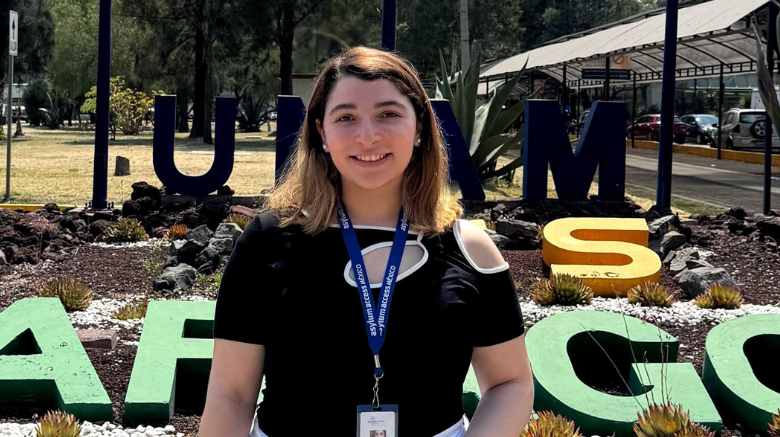She is passionate about supporting forcibly displaced people because she and her family have gone through that as well, not once, but twice. Hanan has been a Palestinian refugee since she was born. Her grandparents were forcibly displaced to Syria in the 40s and although her parents were born there, they didn’t have Syrian nationality – they were always considered refugees. “As a child, I felt that Syria was my country, but I always heard people saying I was not from there, and that hurt,” she recalls.
Hanan was forced to grow up at 13 when her father passed away and the Syrian war started. She learned to be strong from her mother, who overcame tragedy to take care of her children, three girls and a boy.
“It’s a blessing to be alive. My grandparents and uncles lost their homes. Ours was the only one that survived, and everyone moved into our house. I studied in a two-room house with 25 people,” she says. Even with the distractions at home and the bombings outside, she studied Philology and Spanish Literature at Damascus University. “Learning with so many difficulties taught me I could do more. Growing up during the war and as a refugee motivated me to do something to save the world,” she reflects. In 2021, she won a scholarship and moved to Mexico for a Master in Human Rights at the Iberoamerican University.
“It was the safest way to continue my dream of studying and helping my family. Many families had to leave illegally, crossing borders, and drowning in the sea. My family decided to die in the country, together. I remember my mother forced us to stay in the same room during the bombings. She wanted us to die together.” Her family supported her decision to move because they felt it was going to be a safe way out. They were happy she had the opportunity to follow her dream.
Hanan’s plan was to apply the new knowledge working in the humanitarian field in Syria, but when she finished her Master’s, she felt there were no opportunities to return. After her student visa expired, she sought asylum in Mexico. Now, she hopes to bring her family to safety through family reunification. “For my mother, being separated is not an option. If I don’t manage to bring them, she wants to have me there, at any cost.” For this to work, among other challenges, she will need to prove that she’ll be able to financially maintain six adults and their children.
After a 6-month internship at Asylum Access Mexico, Hanan was hired as the Community Outreach and Integration Assistant, as part of the Hospitality Route. She helps forcibly displaced people find jobs, scholarships, a place to live, and guides them through processes like requesting a social security number and accessing health and education services. She also trains potential employers and public officials on migration issues so they can integrate newcomers and offer them opportunities to rebuild their lives.
“I work in human rights because I am a refugee. Sharing the same suffering unites us and makes me help others who went through the same as me. This brings me closer to my clients. I make it clear to them that we are the same and that I am helping them because, at some point in my life, someone helped me too. I want them to achieve their goals as well. I am as happy as them when I help with their needs,” she says.
Reflecting on the particularities of being a refugee woman, she believes they face more dangers and are more exposed, especially when they have fled alone, like her. As a Muslim woman, she came to Mexico wearing a hijab, but she had to remove it because she felt unsafe. “Bringing my culture with me exposed me to Islamophobia. Sometimes refugee women have to get rid of their cultures,” she laments.
In this field, we have to raise our voice asking for reforms, but often we are ignored. It’s a constant fight.
As a woman working in the civil society sector, she raises the challenge of not being heard: “In this field, we have to raise our voice asking for reforms, but often we are ignored. It’s a constant fight.” Also, she feels that women’s empathy and sensitivity are a virtue that helps others but also affects their personal lives: “I don’t come back home after work to continue a normal life. If I haven’t solved a case, I keep thinking about how to help further.”
To facilitate women’s leadership, she believes it is important to provide them with the necessary tools. “All women are leaders, but we have to help them feel secure and supported so they can speak up. They need support to raise their voice,” she explains.
Read more about other refugee women leaders like Hanan: 5 Refugee Women Leading Change for Forcibly Displaced Communities

